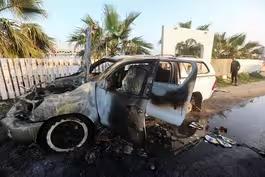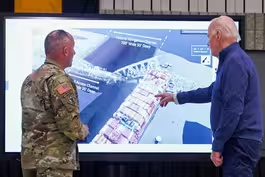
Brooks and Capehart on acceptance of violence in politics
Clip: 4/5/2024 | 10m 40sVideo has Closed Captions
Brooks and Capehart on the acceptance of violence in U.S. politics
New York Times columnist David Brooks and Washington Post associate editor Jonathan Capehart join Amna Nawaz to discuss the week in politics, including a recent poll that found many American adults are ready to accept violence in the U.S. political system.
Problems playing video? | Closed Captioning Feedback
Problems playing video? | Closed Captioning Feedback
Major corporate funding for the PBS News Hour is provided by BDO, BNSF, Consumer Cellular, American Cruise Lines, and Raymond James. Funding for the PBS NewsHour Weekend is provided by...

Brooks and Capehart on acceptance of violence in politics
Clip: 4/5/2024 | 10m 40sVideo has Closed Captions
New York Times columnist David Brooks and Washington Post associate editor Jonathan Capehart join Amna Nawaz to discuss the week in politics, including a recent poll that found many American adults are ready to accept violence in the U.S. political system.
Problems playing video? | Closed Captioning Feedback
How to Watch PBS News Hour
PBS News Hour is available to stream on pbs.org and the free PBS App, available on iPhone, Apple TV, Android TV, Android smartphones, Amazon Fire TV, Amazon Fire Tablet, Roku, Samsung Smart TV, and Vizio.
Providing Support for PBS.org
Learn Moreabout PBS online sponsorshipAMNA NAWAZ: It's been quite a week.
President Biden delivered an ultimatum to our# longtime ally Israel.
And, here at.. of American adults told us they are prepared# to accept violence in our political system.
To discuss all that and more, we# turn now to the analysis of Brooks## and Capehart.
That's New York# Times columnist David Brooks,## and Jonathan Capehart, associate# editor for The Washington Post.
Great to see you both, as always.
I want to pick up where Geoff's interview# with Senator Coons there left off.
Jonathan, you just heard the senator saying that# he is open to conditioning aid to Israel in --## under those conditions as he laid them out.
This# is a close adviser of President Biden saying this,## joining the ranks of some other lawmakers who# have been saying this for a while, we should say.
But after the killing of those seven aid workers,## does this feel like a tipping point# when it comes to President Biden's## relationship with leaders in Israel?
JONATHAN CAPEHART: Yes, I think it is.
We have seen this coming.
How many weeks have# we sat here on a Friday night talking about how,## while the relationship between# the two nations is firm and solid,## the relationship between the two leaders of# those nations, there's daylight coming in there?
And the president and the administration would# say, don't do this, Prime Minister Netanyahu,## and Prime Minister Netanyahu# would basically say, hold my beer.
But the killing of those seven aid# workers from World Central Kitchen,## founded by chef Jose Andres, who is someone# that the president knows -- when the president## went to Ukraine, he went to a World# Central Kitchen meal station during## that trip, owner of restaurants where the# president goes to have dinner sometimes.
AMNA NAWAZ: He's a known# quantity to the president.
JONATHAN CAPEHART: Right, right, right.
So this# is s.. struck him, I think, personally in ways# that other mistakes maybe have not.
But there needed to be a turning point.# There needed to have something happen to## get the president and the administration to be# a little more -- a lot more forceful and to get## the attention of the prime minister, which I think# the president got after that phone call yesterday.
AMNA NAWAZ: David, how do you look# at this?
Do you see this as a tipping## point in the same way?
And do you see U.S.# lawmakers actually moving to condition aid?
DAVID BROOKS: Yes, I don't really think# it's a tipping point.
I think that,## as Chris Coons said, it's been a gradual thing.
I have been talking to experts on this who served# in Republican administrations and .. administrations.
And there's a rough consensus,# which is that Israel has to finish the job on## Hamas.
It would be an absolute disaster for the# region, for U.S. interests if Hamas was somehow## to emerge as an intact political and military# force.
It would destabilize the region forever.
And so that has to happen.
At the same time,# there seems to be a consensus that Israel has## to do a vastly better job at protecting the aid# convoys, at letting the aid in, and particularly,## as Coons said, and if they're going to take --# invade Rafah, which they sort of have to do, they## have to get the million people out of there, and# they have to provide free passage to the north.
And we have to do everything we can to pressure# Israel, and I think some sort of conditions on## aid are -- if Israel's not going to provide the# million to leave and into safe zones in the north,## then we should do what we can to pressure them# to do that, because it would be against Israel's## self-interest to do that, and it would# certainly be against America's interest.
I was cheered by the readout on the# Biden-Netanyahu call.
I had feared## that Netanyahu would want to run for# reelection as running against the U.S.,## say, I'm the guy who can protect you from# the pressure from those craven Americans.
But he did not in the call, apparently.
He# accepted the conditions that President Biden## laid before him.
He's already# complied with a few of them,## and he's promised to apply for more.# And so this pressure may be working,## which Biden wants, to pressure Netanyahu without# cutting them off or putting on conditions.
AMNA NAWAZ: David, there's the issue of# protecting the aid workers, as you mentioned.
But does this also call into question just## how discerning Israel has been in# carrying out its strikes so far?
DAVID BROOKS: Yes, I think there are# two things to be said, contradictory.
The first is, this is a war unlike any other.# Sometimes, people compare this to our -- the## U.S.-Iraqi assault on Mosul and other cities.# But I have never heard of another war where the## enemy is in 500 miles of tunnels underground# and the enemy's chief strategy is to generate## as many civilian deaths as they can to get# world pressure to force Israel to desist.
So this is just a much harder deal.
Having# said that, I have been covering the Middle## East for a little while, and one# has certainly discerned a growing## callousness toward Palestinian# lives in the Israeli population.
I'm not sure how split Netanyahu is from a lot of# the people within Israel itself.
They're -- they## think, why should we risk Israeli soldiers for# -- to protect people who want to kill us?
But it## has to be explained to them that this is in your# own self-interest.
It's just -- a humanitarian## disaster, aside from being a moral atrocity, is in# Israel's self-interest to present -- to protect.
So I think there's both just the horrific# conditions that Israel is fighting under,## but also overaggressive, as we heard# from the expert early in the program,## and a growing callousness# toward Palestinian suffering.
JONATHAN CAPEHART: Yes, and I think the growing# callousness, I think, is what's really sort of## bothering me and why I think that the World# Central Kitchen deaths is a turning point.
The thing that's -- the thing that# bugs me is, for years, I have known,## we all know Israel -- Israel Defense# Forces are among the most sophisticated## armed forces in the world.
And yet,# time and time again since October 7,## we have seen these very sophisticated armed# forces make mistake after mistake after mistake.
And I know mistakes happen in war.
But how# does a mistake like the one that happened## to World Central Kitchen happen when World Central# Kitchen was working in coordination with the army,## letting them know where they were at# all times?
How do you explain that?
And so that's why I think that -- you# add that to the president's relationship,## that phone call with the prime minister# yesterday, and the changes that have been## made, the changes have to keep going,# because, if he does indeed, Netanyahu,## go into Rafah without a plan for what to do# with the million people there, not only will## he lose world opinion.
I think he will lose# the president and lose the United States.
AMNA NAWAZ: Well, if I may bring this# back home now, because, of course,## this is resonating in the same way# as it is with both of you with the## American public -- and we know a lot# of people are very closely watching## how President Biden handles this moment,# especially in some key battleground states.
All of this unfolding at a time# that, at this moment in time,## polls show a very tight race between# President Biden and former President## Trump.
Our latest "PBS NewsHour"/NPR/Marist# poll indicates a 50-to-48 slight lead## President Biden has over former President# Trump.
That is within the margin of error.
But there are a couple of quick takeaways# I want to get both of your takes on,## if you don't mind.
In one question,# we asked Americans if they felt that## Americans have to resort to violence to# get the country back on track.
A majority,## 79 percent, disagreed or strongly# disagreed, but 12 percent of Democrats,## 28 percent of Republicans and 18 percent of# independents agreed violence might be necessary.
Couple that with another question we# asked about whether they wanted to see## a president or a leader who's willing to# break the rules to set things straight,## and some 41 percent of Americans agreed with# that.
That includes 56 percent of Republicans,## 28 percent of Democrats, and# 37 percent of independents.
Jonathan, what kind of picture# does that paint for you?
JONATHAN CAPEHART: So, the violence question,# well, it should be zero percent who say that## violence is necessary.
But that didn't# concern me as much as the break the rules,## someone who is willing to break the# rules to get the country back on track.
That's all -- that's the Trump election# -- that's the Trump campaign right there,## just wants to break the rules to get# the country back on track.
I broke## the rules coming to the studio today.# People break rules all the time.
I... AMNA NAWAZ: I was going to ask, which rules?
JONATHAN CAPEHART: I went over the speed limit.
AMNA NAWAZ: OK. All right.
(LAUGHTER) JONATHAN CAPEHART: I.. JONATHAN CAPEHART: And so I th.. they're not thinking ransack the Capitol.
They're# thinking what they might view as little things.
But when you're talking about Donald Trump,# breaking the rules is breaking law and order,## breaking social -- breaking norms, and# breaking democracy.
And so that's why,## when you have 56 percent saying that# they agree or strongly agree that... AMNA NAWAZ: That's 56 percent# of Republicans, we should say.
JONATHAN CAPEHART: Of Republicans, right... JONATHAN CAPEHART: ... but still a big# number of just.. JONATHAN CAPEHART: ... that's really concerning,# because that inures to the benefit of Trump.
AMNA NAWAZ: David, how do you see it?
DAVID BROOKS: I just want to say I followed# the speed limit on my way here today.
DAVID BROOKS: I had the exact same reaction## as Jonathan.
I'm not a big fan of# that would you resort to viol.. because I don't know what that means.
I don't# know what violence means in that context.
And so people -- when people answer that# question, that they're really saying,## how upset are you about the way things are# going?
But the breaking the rules thing,## that is, to me, also much more upsetting, because# that really is the seedbed of authoritarianism.
And it's mostly on the right.
Trump is scaring# a lot of people that we have to break the rules,## but it's a little on the left.
You hear# people say we need to bust up the system,## we need to tear down the system.
And that way lies authoritarianism.# And you can see it in the Philippines,## you can see it in Hungary, you can see# it in Poland.
Whenever you have a rise## of authoritarianism, it's because people# think that breaking the rules is somehow## OK to make the streets safe.
It's# sort of like the Dirty Harry defense.
And, to me, it's just -- that's the# most worrying part of our survey.
AMNA NAWAZ: Jonathan, I hate to ask you# this in the last 30 seconds or so we have,## but what about the impact of the third-party# No Labels effort ending their attempt to## try to field a presidential ticket?# How does that change the landscape?
JONATHAN CAPEHART: I don't# think it changes the landscape.
But good for No Labels for seeing -- reading the# writing on the wall and paying.. people who they were going to, asking them to be# on the ticket, and those people doing their own## due diligence and going back to No Labels and# saying, no, thank you, but then going public## and saying, I did my due diligence, I'm not doing# this, and I don't think No Labels should either.
Good for them.
AMNA NAWAZ: Jonathan Capehar.. JONATHAN CAPEHART: Thanks, Amna.
Israel draws outrage after airstrikes kills 7 aid workers
Video has Closed Captions
Clip: 4/5/2024 | 3m 46s | Israel draws international outrage after airstrikes kills 7 aid workers (3m 46s)
Israel’s war in Gaza weighs on the holy month of Ramadan
Video has Closed Captions
Clip: 4/5/2024 | 4m | Israel’s war in Gaza weighs on the holy month of Ramadan (4m)
Maryland Governor on complicated Baltimore bridge rebuilding
Video has Closed Captions
Clip: 4/5/2024 | 7m 43s | Maryland Gov. Moore on 'remarkably complicated' Baltimore bridge recovery and rebuilding (7m 43s)
Russia continues to link terrorist attack to Ukraine
Video has Closed Captions
Clip: 4/5/2024 | 5m 43s | Russia continues to link terrorist attack to Ukraine despite conflicting U.S. intelligence (5m 43s)
Sen. Coons explains new openness to conditions on Israel aid
Video has Closed Captions
Clip: 4/5/2024 | 6m 24s | Biden ally Sen. Chris Coons signals new openness to conditioning Israel aid (6m 24s)
What you need to know ahead of Monday's total solar eclipse
Video has Closed Captions
Clip: 4/5/2024 | 7m 21s | What you need to know ahead of next week’s total solar eclipse (7m 21s)
Providing Support for PBS.org
Learn Moreabout PBS online sponsorship
- News and Public Affairs

FRONTLINE is investigative journalism that questions, explains and changes our world.

- News and Public Affairs

Amanpour and Company features conversations with leaders and decision makers.












Support for PBS provided by:
Major corporate funding for the PBS News Hour is provided by BDO, BNSF, Consumer Cellular, American Cruise Lines, and Raymond James. Funding for the PBS NewsHour Weekend is provided by...






